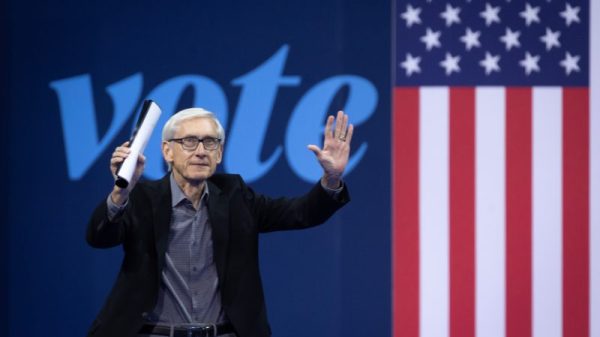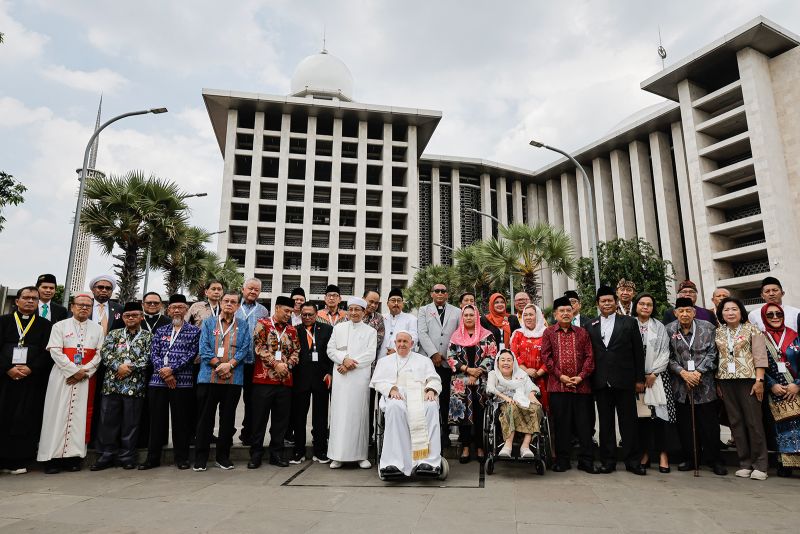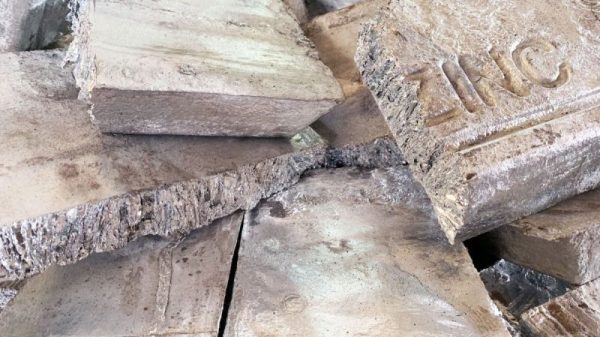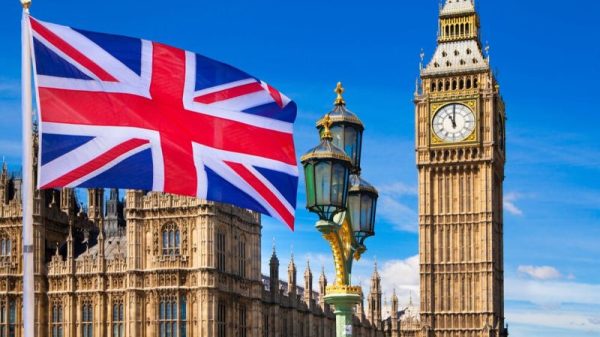Since his papacy began in 2013, Pope Francis has signaled his intention to build bridges with other faiths. The global growth of Islam, and the rise of extremism across religions, also made this an urgent priority.
On Thursday, in the biggest mosque in the world’s largest Muslim-majority nation, the pontiff used a joint statement with Indonesia’s Grand Imam Nasaruddin Umar to pinpoint “two serious crises” facing the world: dehumanization and climate change.
“The global phenomenon of dehumanization is marked especially by widespread violence and conflict, frequently leading to an alarming number of victims,” said the statement, signed in the sprawling capital Jakarta.
“It is particularly worrying that religion is often instrumentalized in this regard, causing suffering to many, especially women, children and the elderly,” it continued. “The role of religion, however, should include promoting and safeguarding the dignity of every human life.”
On climate change, the declaration stated that “human exploitation of creation” had led to “various destructive consequences such as natural disasters, global warming and unpredictable weather patterns,” and an “obstacle to the harmonious coexistence of peoples.”
Francis arrived at Istiqlal Mosque, the largest in Southeast Asia, in the morning, driving past streets lined with well-wishers in a metropolis that is one of the fastest sinking cities in the world. That concern has sparked a controversial and expensive plan to relocate Indonesia’s capital entirely.
The mosque is next-door to the city’s Catholic cathedral, and the pope visited an underpass known as the “tunnel of friendship” which connects the places of worship.
As part of the event, the pope also listened to Islamic prayers being recited by a young blind girl named Syakila, the winner of a national Quran recitation competition.
His Indonesia trip and the signing of the declaration are in keeping with his bridge-building approach. But while about 87% of Indonesia’s 280 million people practice Islam, the visit also puts the spotlight on its 8.6 million Catholics and other minorities.
His arrival in the archipelago nation “is good news for us, something that strengthens our faith,” said Father Hieronymus Sridanto Ariwobo, a Catholic priest in Jakarta.
“And secondly, the pope will come here as a symbol (of) the relationship between the Christian and Muslim here in the country.”
Historically, the country’s form of Islam has been moderate and syncretic, often sitting comfortably alongside animist and other pre-Islamic practices, while the state ideology, known as “Pancasila,” encourages religious freedom and social justice.
“Indonesia is a great country, a mosaic of cultures, ethnicities and religious traditions, a rich diversity, which is also reflected in the varied ecosystem,” Francis said during Thursday’s inter-faith meeting, which the pontiff spent in a wheelchair. “May no one succumb to the allure of fundamentalism and violence.”
The 87-year-old is currently on the longest trip of his pontificate, despite facing health challenges and having started to use a wheelchair in recent years.
He is scheduled to hold a mass at Jakarta’s National Stadium later Thursday, which is expected to be attended by about 80,000 people.
The following day he leaves for Papua New Guinea, the second leg of a marathon 12-day visit of four countries in Southeast Asia and the South Pacific, which also includes East Timor and Singapore.
Religious plurality
Indonesia is a symbolically strong choice for the kind of inter-faith approach Francis has embraced.
In the 13th century, traders from Arabia, Gujarat and China reached what is now Indonesia, buying cloves, cinnamon and nutmeg. Some of those spice-trade merchants also brought with them Islam and, as some settled on the islands of Java and Sumatra, the religion gradually blended with local animist beliefs.
Christianity came to Indonesia with Portuguese traders more than 200 years later, mainly in the eastern islands of Maluku and Timor. The Jesuit missionary St. Francis Xavier worked in the Maluku islands, but by the late 1600s the Dutch East India Company had expelled all Catholic missionaries.
After Japanese occupation during the Second World War, nationalist leaders Sukarno and Mohammad Hatta declared Indonesian independence in 1945. Muslims and Christians have coexisted in Indonesia for decades since its modern founding, and most of its Islamic believers are broadly moderate and syncretic.
But there have been occasional bouts of religious tension. In 2021, two suicide bombers attacked Sacred Heart Cathedral in Makassar on Indonesia’s Sulawesi island during a Palm Sunday Mass, injuring at least 14 people. In 2018, at least seven were killed in three church bombings in Indonesia on the same day.
Religious minorities have at times faced attacks from vocal Islamist extremist groups and some parts of Indonesia are more conservative, such as the province of Aceh, which practices strict Islamic laws.
“Indonesia [is] like a huge laboratory for experiencing a different kind of Islam, a different kind of democracy,” said Ulil Abshar Abdalla, a leader of Nahdlatul Ulama, the country’s biggest Islamic organization.
Milawati, a Catholic who like many Indonesians goes by one name, said she hopes the pope’s visit will send a message to her compatriots to “live a life of mutual love, respect and tolerance between other religions” so that the country may progress.
“As Catholics, we view all religions as having the same goal, living a good and righteous life and believing in God the Creator,” she said.
And Elia Dimas Indahputro, a 47-year-old sound engineer, said the significance of religion is sometimes overstated in parts of Indonesia, adding that mingling between people of different creeds is common.
Francis’ Indonesia visit follows trips to other majority-Muslim nations such as Egypt, Morocco and the United Arab Emirates, with the latter marking the first time a pope had travelled to the Arabian Peninsula. While in Abu Dhabi in 2019, he signed a historic declaration on inter-faith co-operation with the Grand Imam of Al-Azhar, Sheikh Ahmed al-Tayeb, the leading Sunni Muslim leader.

























